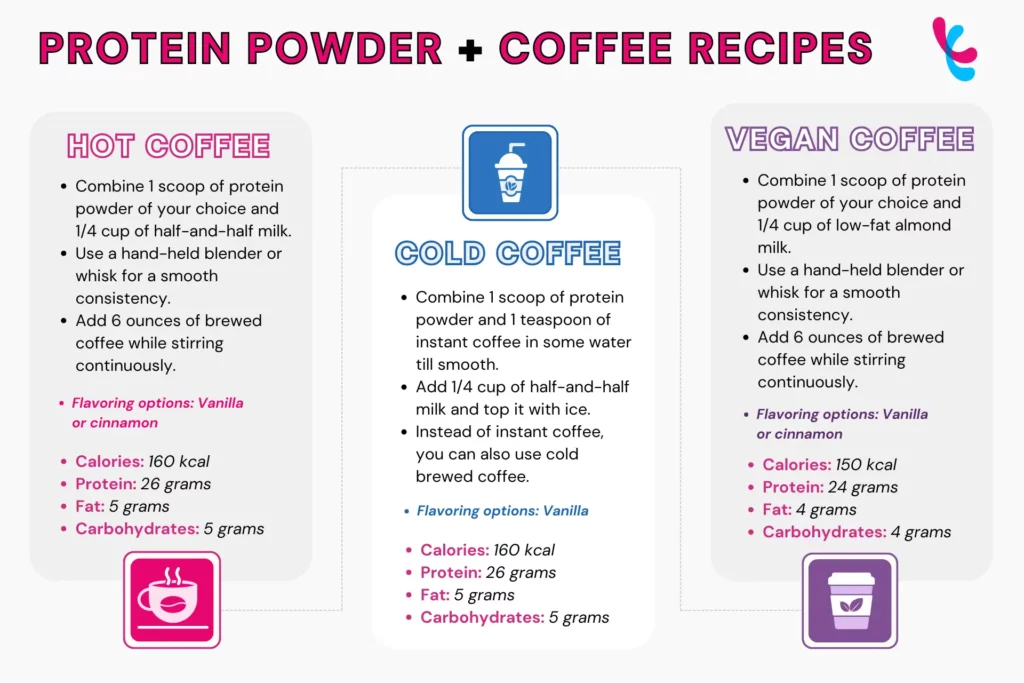Starting your day with a combination of protein powder and coffee, or "proffee," has become a popular choice for fitness enthusiasts and health-conscious individuals alike. This trendy beverage promises to boost energy levels, support weight loss, and enhance workout recovery—all in one cup. But is it as effective and safe as it sounds? Experts weigh in on this trendy drink, its benefits, and potential risks.
Can You Put Protein Powder In Your Coffee?
Yes, you can. Adding protein powder to your coffee may just be one of the best ways to increase your protein intake and get your caffeine kick in the mornings.
This drink, which goes by the nickname Proffee, is commonly made by adding a scoop of whey powder to black coffee or espresso.
How Safe Is Adding Protein Powder to Coffee?
Adding protein powder to coffee is generally considered safe.
However, it is important to adjust the amount of protein powder to meet your needs.
It’s generally recommended to consume not more than 1-2 scoops per day.
Similarly, drinking 2-3 cups of coffee is safe for most; however, some may need to consume less.
Benefits Of Adding Protein Powder To Your Coffee
Helps Meet Protein Requirements
Protein is key for building and repairing bones, muscles, cartilage, skin, hair, and nails. It is best taken in small amounts throughout the day.
The recommended intake of protein is around 0.25 - 0.4 g per kilogram of body weight.
Adding protein powder to your morning coffee can boost your protein intake early in the morning, making your breakfast wholesome.
May Support Weight Loss
Both protein and caffeine have proven benefits when it comes to weight loss.
Protein is highly satiating - meaning it can keep you fuller for longer, thereby curbing calorie consumption throughout the day.
It also helps burn more calories since more energy is required to digest protein compared to carbs or fats.
Caffeine lowers the levels of hunger hormones, increases the levels of satiety hormones, and boosts metabolism, thereby aiding weight loss.
May Enhance Workout Performance
For people engaging in intense cardio and strength training, the protein intake must be 1.2 - 1.7 g per kilogram of body weight.
Protein helps muscle recovery post-workout and caffeine aids in muscle contractions and delays muscle fatigue.
Consuming proffee before or after a workout offers similar benefits.
Adds To Flavor And Convenience
Not many are a fan of the taste of protein powders and shakes. So, if coffee is your thing, then adding proffee can be a good option for you.
Surveys suggest that while many skip their breakfasts, most have their morning coffee.
Although not a meal replacement, adding protein to coffee is an easier way to get your morning dose of protein.
If protein powder is added to blended oats, peanut butter, seeds, and instant coffee, your new proffee can be your breakfast!
What Evidence Says
Scientific research supports the potential benefits of combining coffee and protein powder, though the evidence for some claims is stronger than others.
- Protein's Role in Muscle Recovery and Weight Loss
Studies have consistently shown that protein consumption supports muscle recovery and repair, especially post-exercise. A study highlights that protein intake before or after exercise can positively influence recovery from both resistance and endurance training. Additionally, protein’s satiating properties can aid in weight management by reducing hunger and increasing feelings of fullness. - Caffeine’s Impact on Performance and Metabolism
Caffeine is well-documented for its ability to enhance physical performance. A study in the Journal of the International Society of Sports Nutrition (2019) found that caffeine improves endurance, delays muscle fatigue, and increases VO2 max (a measure of how much oxygen your body can use when exercising) during exercise. Moreover, caffeine can boost metabolism and promote fat oxidation, aiding in weight loss. - Combining Protein and Caffeine for Synergistic Benefits
Although direct studies on combining protein powder and coffee are limited, existing evidence supports their individual benefits. Studies indicate that caffeine and protein could potentially enhance muscle glycogen replenishment and recovery. The synergy of protein’s role in muscle repair and caffeine’s energy-boosting properties makes this combination promising for fitness enthusiasts.
Did you know your genetics may influence how your body processes caffeine?
Some people are naturally "fast metabolizers" of caffeine, while others may experience jitters and slower caffeine clearance due to genetic factors. Curious about how caffeine works with your unique biology?
Check out our blog post: How It Works: Caffeine and Genetics
or explore our Genes and Caffeine Report to discover your caffeine sensitivity profile.
Expert Opinion On Protein Powder In Coffee
While proffee is promoted as a convenient way to boost protein intake and enjoy your caffeine fix, its effectiveness and safety can depend on your individual health needs.
To provide clarity, nutrition experts share their insights on the benefits, potential drawbacks, and best practices for incorporating protein powder into your coffee routine.
Here’s what they have to say.
Anna Bohnengel, a registered dietitian and fertility nutritionist, notes that women (or those assigned female at birth) are more prone to elevated cortisol levels in the morning.
Drinking coffee on an empty stomach can worsen this.
To counteract this, she recommends consuming protein alongside coffee to maintain muscle and support fat metabolism.
However, adding protein powder to coffee isn’t the only solution—a protein-rich breakfast paired with coffee works just as well.
Catherine Gervacio, a registered nutritionist-dietitian and certified exercise nutrition coach, highlights that people with gut issues should be cautious when combining protein powder with coffee, as it could lead to an upset stomach.
She also advises those with pre-existing health conditions, such as kidney disease, to carefully plan their macronutrient intake.
Catherine insists on consulting a healthcare provider before incorporating proffee into their diet.
Bree Phillips, a registered dietitian at UCSF Health, emphasizes the convenience of protein coffee for those struggling to meet their protein requirements throughout the day.
She explains that adding protein to coffee can help fill nutritional gaps, particularly for people who often skip meals or find it difficult to incorporate enough protein in their diet.
However, she also warns people to evaluate their actual protein needs before jumping on this trend.
Dawn Menning, a registered dietitian, also offers similar views in terms of proffee being a convenient way to consume protein.
Balancing Benefits and Precautions
Experts agree that while protein coffee offers convenience and potential nutritional benefits, it’s important to ensure it fits your unique health needs.
For individuals with specific health concerns, consulting a healthcare provider can help determine whether this trendy beverage is a good fit.
Whether you choose proffee or a traditional protein-rich breakfast, the goal is to balance nutrition and personal wellness.
What Are The Side Effects Of Protein Powder In Coffee?
Adding protein powder to coffee is safe for most people, but here are some potential side effects:
- Digestive discomfort: Bloating, gas, or diarrhea due to additives or lactose in whey.
- Overconsumption of protein: May strain kidneys if daily intake is too high.
- Allergic reactions: Symptoms include rash, swelling, or difficulty breathing.
- Additive risks: Artificial sweeteners or contaminants may cause headaches or nausea. Some reports suggest the presence of heavy metals and other contaminants in protein powders.*
*to mitigate risks, choose clean-label products from reputable brands.
How to Minimize Side Effects
- Choose the right protein powder: Opt for clean-label powders with minimal additives and allergens that suit your dietary preferences.
- Moderate your coffee intake: Stick to 2-3 cups of coffee per day to avoid excessive caffeine consumption.
- Follow daily protein recommendations: Align your intake with your body weight and activity level.
- Listen to your body: If you experience discomfort, consider alternative ways to consume protein, such as with a balanced breakfast.
By understanding these side effects and taking preventive measures, you can safely enjoy the benefits of protein powder in coffee without compromising your health.
How To Add Protein Powder to Coffee?
Adding protein powder to your coffee is simple and can be done in a few easy steps. Here’s how you can make your own “proffee”:
- Choose Your Coffee Base
- Brew a cup of hot coffee or espresso.
- Let it cool slightly to prevent clumping when mixing in the protein powder.
- Pick Your Protein Powder
- Choose a protein powder that complements the flavor of your coffee. Whey protein, collagen peptides, or plant-based powders like pea or soy protein are great options.
- Vanilla, chocolate, or unflavored varieties work well with coffee.
- Mix It Smoothly
- In a shaker bottle, blender, or milk frother, combine your coffee with a scoop of protein powder. This helps dissolve the powder evenly and avoids lumps.
- If you don’t have a blender, whisk the protein powder into your coffee gradually while stirring.
- Customize Your Drink
- Add extras to suit your taste: milk or milk alternatives, sweeteners, cinnamon, or even a dollop of whipped cream for indulgence.
- For a breakfast-like treat, blend in ingredients like oats, peanut butter, or seeds.
Coffee And Protein Powder Recipe

FAQs On Protein Powder And Coffee
Can I Drink Coffee After Protein Powder?
Yes, you can drink coffee after consuming protein powder. Many people combine the two for convenience or have them separately, depending on their preferences.
Does Coffee Interfere With Protein Absorption?
No, there is no strong evidence to suggest that coffee interferes significantly with protein absorption. However, excessive caffeine intake may affect digestion in some individuals.
How Much Protein Powder To Put In Coffee?
It’s generally recommended to use one scoop of protein powder (20-30 grams) in your coffee, but this may vary based on your daily protein requirements and dietary preferences.
Why Should You Have Protein Before Coffee?
Consuming protein before coffee can help stabilize cortisol levels, particularly in the morning, and reduce the potential muscle breakdown caused by elevated stress hormones.
What Is The Best Protein To Add To Coffee?
Whey protein is one of the most popular options due to its smooth texture and fast absorption. Plant-based proteins, like peas or soy, can also work, depending on dietary preferences.
Summary: Coffee And Protein Powder
- Protein powder in coffee, commonly known as proffee, is a new health fad that helps energize you while meeting your protein needs.
- Proffee can help meet protein requirements and boost your workout performance while combining flavor and convenience.
- There is clear evidence to support the role of coffee and protein powder in energizing and fueling workouts.
- However, some experts warn against proffee if you are pregnant or have existing gut issues.
- Some side effects of proffee include kidney strain from too much protein, digestive discomfort, and possible allergy risks.
- If you're considering proffee, it's best to evaluate your protein needs beforehand. A healthcare provider can guide you most effectively.
Expert-recommended Reads

Is Vitamin Water Good For You? What The Experts Say

Exercise Snacking: The Key To Staying Fit When You’re Too Busy

Top Five Teas For Better Gut Health In 2024
References
- https://www.mdpi.com/2072-6643/10/2/224
- https://www.health.harvard.edu/blog/extra-protein-is-a-decent-dietary-choice-but-dont-overdo-it-201305016145
- https://cdn.clinicaltrials.gov/large-docs/19/NCT05774119/Prot_SAP_ICF_000.pdf
- https://pmc.ncbi.nlm.nih.gov/articles/PMC6142015/
- https://jissn.biomedcentral.com/articles/10.1186/s12970-020-00383-4
- https://pmc.ncbi.nlm.nih.gov/articles/PMC5306327/
- https://pubmed.ncbi.nlm.nih.gov/34033621/
- https://www.healthline.com/nutrition/caffeine-and-exercise#fat-loss
- https://www.researchgate.net/publication/51706409_Impact_of_Caffeine_and_Protein_on_Postexercise_Muscle_Glycogen_Synthesis
- https://pmc.ncbi.nlm.nih.gov/articles/PMC7803445/
- https://www.health.harvard.edu/staying-healthy/the-hidden-dangers-of-protein-powders
- https://pmc.ncbi.nlm.nih.gov/articles/PMC7460905/




